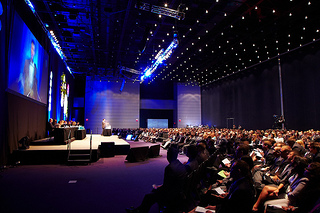
I recently spoke with an executive team at an event marketing agency about how to measure events. We’re preparing for a conference at which PortMA was hired to provide a workshop on event and meeting return-on-investment (ROI) measurement methods.
Event ROI Measurement: 2013 versus 2014
In doing research for this workshop we came across a lot of data (much of it published by the Event Marketing Institute) that told of the growth of ROI measurement in the industry in three areas:
- Event ROI measurement was more common in 2014 than 2013. The percent of event organizers who reported they are measuring ROI increased 5 percentage points year over year.
- Event ROI measurement is growing, both among brand managers and agencies. This 5 percentage point increase was true on both the agency and brand sides.
- The ROI of these events was, on average, stronger in 2014 than in the year prior. The number of agency event managers who reported that they were delivering a 3-to-1 return for the brand doubled from 14% in 2013 to 28% in 2014.
- Those responsible for events are not only measuring more often, they’re also delivering stronger returns. I would argue that the two are linked.
You Can’t Manage What You Don’t Measure
The fact that ROI is improving is no surprise. When done right, an event ROI measurement strategy doesn’t just tell you the final ROI. It also tells you why it is what it is. When you understand why, you can go back into the model and use it to create hypothetical scenarios.
For example, what happens when you increase the onsite staff? This increases costs, but it may also increase guest engagement. How does doing so increase or reduce the overall return?
What about cutting a glitzy footprint component? That will cut costs, but it might also reduce foot traffic, and perhaps, even impact. How much foot traffic can I afford to lose before I start to hurt the overall return for the brand? And, does the cost savings justify this?
These are real, strategic questions that, when addressed, can directly impact how we design and plan for future activation. Done right, it is so very actionable.
Performance measurement is on the rise. People are wise to the fact that better measurement leads to more accurate results.
How would you grade yourself? Is your measurement actionable? Is it giving you the insights you need to deliver year-over-year returns?
Photo Source: https://www.flickr.com/photos/cydcor/
